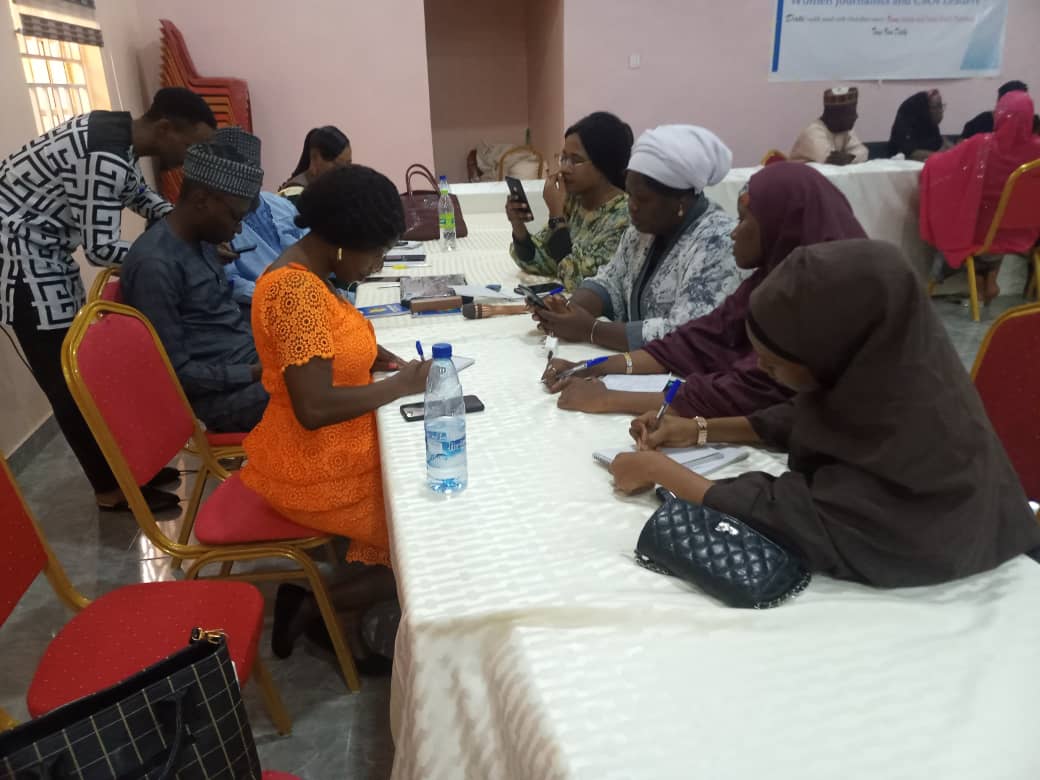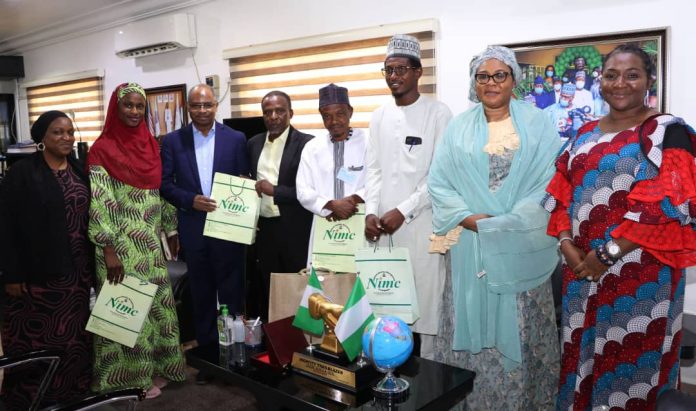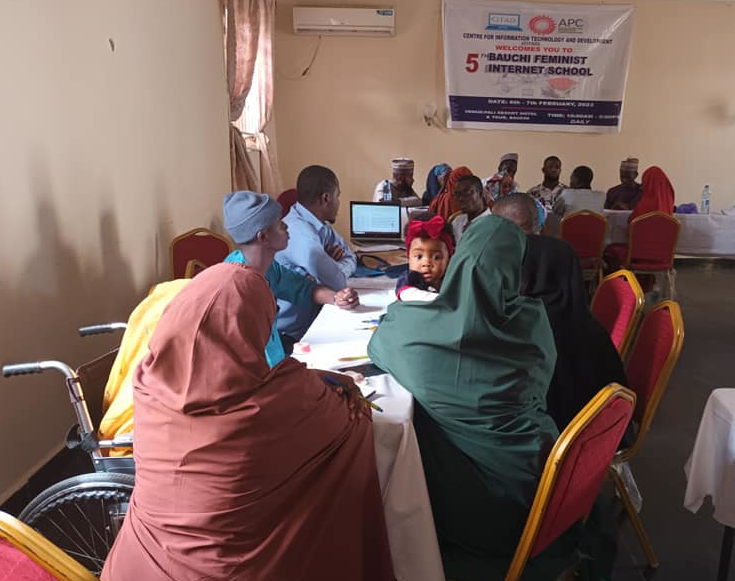
Advocating for the protection and promotion of digital rights is a continuous challenge faced by civil society organisations. How do we come to establish equality as a baseline?
Nigeria-based APC member Centre for Information Technology and Development (CITAD) recently undertook a three-pronged approach to this: empowering civil society (especially women), raising public awareness and directly supporting advocacy efforts. Throughout their project entitled “Enhancing the Flourishing of Digital Rights in Nigeria” and supported by an APC subgrant between November 2022 and May 2023, CITAD built civil society capacity to dismantle the digital divide. “Our realisation was that it is not just about access to technology. Even if you provide skills, you provide devices, you still have some major problems,” reflected Y. Z. Y’au, CITAD’s executive director.
CITAD’s diverse range of activities, outlined below, included the following:
- Training of civil society leaders and female journalists
- National stakeholders meeting on digital rights in Nigeria
- Monthly Twitter/X discussion spaces over six months
- Fifth Bauchi Feminist Internet School (BaFIS)
- Eight monthly press conferences
- Six public discussion forums
- A Media Day of Action on Digital Rights in Nigeria
- Three advocacy visits to key government agencies
- Two participant surveys conducted to understand levels of awareness on digital rights before and after the project.
Increasing capacity of digital inclusion champions
CITAD set about increasing the capacity of women to understand their digital rights, enhance their safety online and use the internet as a tool for empowerment. The first phase included a two-day digital security training for 31 female journalists, civil society leaders and youth. In turn, those 31 participants went on to offer these trainings to 449 individuals in their various communities and shared information on radio and television programmes. One participant expressed that prior to the training, she did not have knowledge of protecting herself online, or that she could take legal action against privacy violations, both being key takeaways learned during the training.

A second capacity-building effort took place with the fifth edition of CITAD’s Bauchi Feminist Internet School (BaFIS), established in 2016 to produce “digital inclusion champions who will join other champions for bridging the gender digital divide in the country.” The 34 participants who took part in the 2023 edition explored pathways for gender inclusion alongside intensive training on access to and use of the internet (especially social media).
“What we found out was that a lot of women and girls have internalised the fear of the internet because of content that they find disagreeable, experiences of people who have been subject to gender violence online, or women who have been profiled and ridiculed in the media and so forth, so many of them keep away from digital spaces,” Ya’u explained. Addressing these fears and creating ample room for women to participate while also ensuring that men deepen their understanding of digital inequality is what made BaFIS training truly empowering. “You have an environment that is structured by patriarchy,” Ya’u said. “We thought that it’s possible to bring men and women together and try to understand what we collectively require to be in that space.”
This inclusive approach was echoed by a participant who remarked that BaFIS was the most impactful training she had attended because she was now able to secure her devices and social media profiles, as well as have a better understanding of digital rights.
At BAFIS, we teach people to READ technology and to interrogate it well to understand its underlying assumptions that are often hidden to a casual reader. We expose the patriarchal undertones that shape how digital technology is deployed in societies. @APC_News @HassanIdayat pic.twitter.com/TcMiLfrDnf
— Yunusa Ya'u (@YZYau) February 1, 2023
CITAD’s methodology is strongly grounded in the Feminist Principles of the Internet, using concepts like consent, memory, expression and resistance that resonate with people’s lived experiences and create a basis for discussion using a rights-based approach. “The view of the internet from the perspective of gender and feminist analysis unpacks the liberatory impulse of technology, both in terms of subverting patriarchal control and in demystifying the fear we have about the internet,” Ya’u reflected.
Raising public awareness through public sensitisation campaigns
One of CITAD’s most far-reaching efforts to raise public awareness on digital rights involved working with youth on creating monthly “spaces” on Twitter/X over six months, to encourage engagement between the public and digital rights experts. These public sensitisation campaigns were an excellent opportunity for the “champions” from CITAD’s trainings to apply their learned skills and participate in online advocacy. “We wanted the younger generation of people who are already somehow occupying that space,” Ya’u stated, since they are the ones who are active online.
Join our Spaces discussion tomorrow at 11am,Dr. @Abdulhamidu2, a digital rights advocate will moderate a discussion on our Champions Efforts at Promoting Digital Rights in Nigeria. A great panel consiting of @salimpotter, @lyndankechi1 & @joygadani will share their perspectives pic.twitter.com/bEYvOPgWRK
— CITAD (@ICTAdvocates) March 28, 2023
Further outreach efforts included a series of eight press conferences covered by national media calling for the passage of the Digital Rights and Freedoms Bill, which resulted in the release of two individuals who were detained for airing their views by the Department of Security Service and Nigeria Police Force. In addition, CITAD organised six public forums to discuss different elements of digital rights, with presentations by expert speakers. A Media Day of Action on Digital Rights further reinforced different options for protecting and defending digital rights, which was also covered by eight radio stations and the Nigerian Television Authority.
Engaging in collective advocacy on the Digital Rights and Freedoms Bill
On 26 January 2023, CITAD convened a National Stakeholders Meeting on Digital Rights in Abuja, which brought together 40 participants from different sectors to discuss Nigeria’s proposed Digital Rights and Freedoms Bill. The intent was to increase participants’ understanding on key digital rights issues, with the further aim of exploring opportunities for collective advocacy to help push through the proposed bill.
The Digital Rights and Freedoms Bill has undergone a complex process over the last three years. “The bill’s potential is really to institutionalise digital rights as legally accessible rights,” explained Ya’u. Unfortunately, a lack of understanding on digital rights and a series of bureaucratic roadblocks have meant that the bill’s adoption has been slow and laborious. “We haven't been able to get an explicit commitment from government, which is worrying when it comes to technology-assisted violence. There hasn't been any specific law to deal with that very challenging problem,” Ya’u said.

As part of its project, CITAD organised advocacy visits to key government agencies with the aim of building strategic partnerships to help push through the bill. These visits included the Nigerian Communications Commission, the National Identity Management Commission and the National Human Rights Commission (NHRC). Each visit built partnerships and resulted in deeper engagement, staff trainings and, in the case of the NHRC, support for the passage of the bill. “One of the positive things that we have seen is that the government has now signed the Data Protection Law, which provides a level of protection around personal data and privacy,” Ya’u noted.
Moving toward representation
There are positive indications that raising public awareness is possible through dedicated campaigns and activities like those carried out by CITAD. According to surveys conducted among participants before and after the project, there was an 87% increase in awareness about the concept of digital rights within the communities where the project was implemented.

Advocating for digital rights in Nigeria continues to guide CITAD’s work, with a lack of public understanding of the issue being a big part of the challenge. “Technology-assisted gender-based violence often takes place in privacy and victims frequently tend to be silent,” Ya’u explained. “They don't want it out because once it is publicised, they come under an additional level of trauma. Because of that, people still think that gender violence and discrimination are actually insignificant. We need a way in which to make it more visible so that the government can take it more seriously.”
Ya’u pointed out that one of the major barriers that prevents governments from implementing stronger laws on online gender-based violence comes from the disproportionately high number of men in positions of power. “The majority of technology-related government agencies that make the rules, regulations and policies are predominantly led by men with very little understanding of the abuse that women and girls encounter in digital spaces,” Ya’u stated.
This is a challenge that urgently needs to be confronted, one where the continued training of women stands as a critical path forward in order to achieve the goals set out by digital rights advocates and civil society groups.
This piece is a version of the information provided by CITAD as part of the project “Enhancing the Flourishing of Digital Rights in Nigeria”, adapted for the Seeding Change column. This column presents the experiences of APC members and partners who were recipients of funding through APC's core subgranting programme, supported by Sida, and of subgrants offered through other APC projects.
You can read about other projects undertaken by CITAD with the support of an APC subgrant.
Did this story inspire you to plant seeds of change in your community? Share your story with us at communications@apc.org